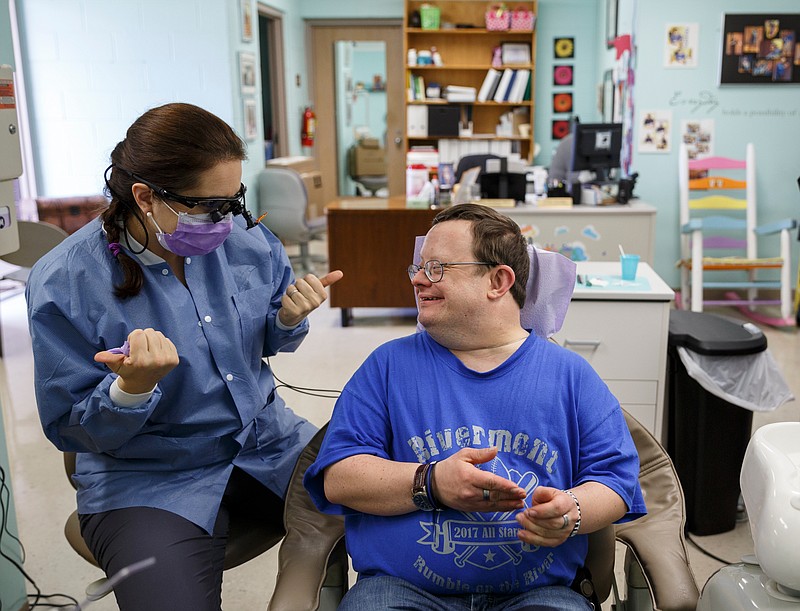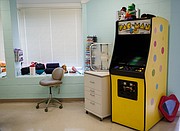What if the simple choice of going to see a dentist wasn't available to you?
That's the plight of many people with disabilities, despite slowly changing public perceptions and laws that protect them from discrimination.
Approximately 102,000 Tennesseans, according to data from the state's Council on Developmental Disabilities, have intellectual and developmental disabilities, a broad category that includes autism, epilepsy, cerebral palsy, fetal alcohol syndrome and other disorders that manifest at birth or during childhood. Disabilities can be physical, such as blindness, cognitive or a combination of the two, and may be caused by genetic conditions, health problems or environmental exposures.
Most disabilities are life-long and complex, and while there are medical professionals who specialize in treating this population, many individuals with disabilities - particularly adults with special needs - struggle to find providers who are trained and willing to treat them.
"The medical community often is just not prepared to or they don't have experience with treating people with intellectual disabilities, and that applies, I think, even more stringently toward dentists," said Wanda Willis, executive director of the Tennessee Council on Developmental Disabilities. "We hear from family members that they have a real difficult time finding dentists."
Nearly two decades since the landmark Americans with Disabilities Act was passed, individuals with disabilities remain "the largest minority population in the U.S. without adequate dental care," according to a 2017 report in the academic journal Special Care in Dentistry.
The latest U.S. Census Bureau data found Americans with disabilities represent 12.6 percent of the general population, and disability advocate Jean-Marie Lawrence said that's a big minority.
"But it's the minority that gets overlooked, a lot," said Lawrence, who was born with limb-girdle muscular dystrophy, a category of rare, inherited neuromuscular diseases that cause progressive muscle weakness and wasting. As a result, she must use a wheelchair.
Lawrence works full time at the University of Tennessee at Chattanooga, serves on the Council on Developmental Disability, and aside from an assistant who comes twice a day to help her get up and dressed, she lives alone. But accessing medical care, particularly dentistry, is a major challenge, because she needs assistance transferring out of her wheelchair.
"Most of my doctors are at hospitals, because hospitals have lift teams," she said. "I haven't really explored getting my teeth cleaned in years - every dentist I've called won't see you and clean your teeth and stuff if you can't get in the chair."
Medical offices may meet Americans with Disabilities Act requirements for ramps but still be unable to see people in wheelchairs because of the inability to transfer patients to exam tables or chairs, and providers are often uncomfortable treating them otherwise.
Lawrence said even if she could find a dentist who would let her stay in the wheelchair, there are additional hurdles. Her muscular dystrophy makes it hard for her to swallow, so she's at risk for aspiration, and her jaw is contracted, so the dentist needs smaller instruments.
"I can easily choke on my spit if someone isn't constantly monitoring the fluid buildup in my mouth," she said. "Every different disability brings different challenges."
For example, families are always looking for places that are "autism friendly," said Scott Kramer, program director of the GCA Centre for Adult Autism, a program of the Chattanooga Autism Center that offers support for autistic adults and their families.
Autism is a neurological disorder characterized by challenges with social skills, difficulty communicating and repetitive behaviors. The range and severity of symptoms can vary widely, hence the term "autism spectrum."
Kramer founded GCA after he was officially diagnosed in 2007 with classic autism - a disorder he had unknowingly managed throughout his life - and was unable to find a local autism organization that catered to adults, since most services are for children.
"Some people think autism stops after a person graduates from high school, or this or that, but it doesn't. Autism is something that goes on for the rest of a person's life," he said.
A lack of insurance among adults with autism and other developmental disabilities is a huge problem, because Medicaid only covers children, and the unemployment rate for this population is high.
Kramer said he's been fortunate to find a couple of providers, such as Volunteers in Medicine in Chattanooga and Primary Health Care Centers in Northwest Georgia, but the communication challenges that come with autism present a major barrier for some. Others prefer structured environments, so things outside their comfort zone are overwhelming, and prior negative experiences or stigma can also be barriers.
"One of the things you have to take into consideration is that autism is a spectrum, meaning that children and adults on the autism spectrum could be like dots all over a scatter graph with various communication and social challenges," he said.
Willis said the provider issue is due in part to societal changes 20 to 30 years ago when people with intellectual disabilities who were traditionally served by institutions integrated into the general population.
"That created a whole shift in the need for professionals, locally, to support those individuals just like they support other members of the community," she said, adding that most older providers were never trained to treat people with disabilities. "We've got a little bit of catching up to do."
A copy of a newspaper ad from 1953 hangs outside the office of Dr. Rick Rader, director of habilitation at Orange Grove Center in Chattanooga, as a reminder of the past. That year, the center was founded by families of children with intellectual disabilities in Hamilton County who needed educational services.
"This basically was the ad that started everything," he said. "In the 1950s, if you gave birth to a kid with birth defects, the doctor would say, 'Send them to the institution and concentrate on the healthy ones.'"
At the time, Rader said, the dental care protocol for challenging patients was to pull all their teeth. To this day, special needs dental training is typically limited to a few lectures, and in lieu of proper training, practitioners often turn these patients away or rely on sedation.
Neglecting oral health can be detrimental to one's overall health. Some people with disabilities lack the verbal ability to say "I have a toothache," so it's up to caregivers to recognize that changes in behavior could signal something as simple as mouth pain.
"There's nothing more distressing than hearing at autopsy that the cause of the death was from an oral abscess that migrated to the brain," he said. "If you don't look for them, you don't find them, and if you don't find them, you can't treat them."
Rader said the dental clinic at Orange Grove aims to "demystify the methodology about caring for this population" and prides itself on being able to perform dental care in an office to people who previously have always gone to an operating room.
"We're not advocating for the creation of a subspecialty," he said. "We're advocating for the general dentist to embrace this population."
The need to train more competent providers prompted Willis and the council to award a grant in 2006 to Orange Grove for Project Open Wide.
The project provided internship opportunities and training for dental hygienists and dental students, a practice the center has maintained in the years following the grant. It is the only site approved by the University of Tennessee to train students in special needs dentistry.
"I see some glimmer at the end of the tunnel, because of programs like Orange Grove," Willis said.
Although some cases are beyond the scope of a general dentist, Rader's philosophy is that many more dentists could treat special needs patients with a few simple tools and awareness.
Dr. Misha Garey, director of dental services at Orange Grove, uses music, games, movies and even food to make her patients comfortable.
She said many of the techniques are common sense, but patience and communication with caregivers are key. She has everyone fill out a pre-appointment questionnaire that offers insight into a patient's likes and dislikes.
"A teenager came in who had never been able to sit in the dental chair, and their family told me they like lists," Garey said, so she wrote down everything in a dental exam, but forgot one step.
"We were successful, because we could take the time to let him touch everything, see everything and then trust us with the list, but I couldn't do the thing that wasn't on the list," she said.
Jim Hollingsworth, a fourth-year dental student at the University of Tennessee in Memphis who came to Chattanooga in January to complete a rotation at the clinic, said that was his first time treating patients with developmental disabilities.
"It's just something we don't get exposure to at school. We're told to usually refer these patients out," he said. "It's been good being here and seeing that this is a population that we could serve."
Some Orange Grove dental patients, like 35-year-old Michael Bibby from Hirum, Tenn., travel for hours, because they can't find a dentist close to home.
"Before there was a place like this, he had to go to UT in Knoxville and be sedated like he was going to have surgery, just to have his teeth cleaned," Bibby's mom Angie Fleming said. "That's dangerous, too - being put under anesthesia - you never know, especially with the medications that he takes."
Bibby is autistic and has other chronic conditions that require medication, which is common for many people with developmental disabilities. Garey said the goal should be to save sedation for invasive procedures because of the added risk, as well as the additional time and cost.
Jim Dake, 37, has been a patient at Orange Grove for about five years. He arrived at the clinic Thursday afternoon for his routine checkup and opted for a movie about sea turtles and cotton candy toothpaste.
"He wanted to come and get his teeth cleaned just about as much as he wants to play baseball," and he loves baseball, his father David Dake said.
His mother, Jean Dake, said he does well as long as things are explained to him. He laughed when Garey told him "what a good picture" he took in his X-rays. The whole process took about a half-hour and went off without a hitch.
"We're a clinic based on the intention of transferring our knowledge skills and experience to the community," Rader said. "I hope that one day there won't be a need for a clinic like this."
Contact staff writer Elizabeth Fite at efite@timesfreepress.com or 423-757-6673.

